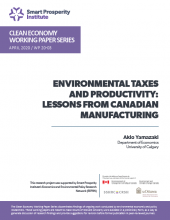April 28, 2020
This paper investigates how environmental taxes affect manufacturing productivity by examining British Columbia’s revenue-neutral carbon tax. It develops a new hypothesis, the “Productivity Dividend Hypothesis,” to show that environmental taxes can positively affect productivity by recycling tax revenues to reduce corporate income taxes. This revenue recycling increases investment and could raise productivity more than environmental taxes lower it, by diverting resources from production. This hypothesis is evaluated using detailed confidential plant-level data. Results indicate that negative productivity impacts are offset to some extent by revenue-recycling, with the policy generating a net gain in productivity for some plants.
The Clean Economy Working Paper Series disseminates findings of ongoing environmental and clean economy work conducted by researchers from a range of disciplines. These working papers are meant to make results of relevant scholarly work available in a preliminary form. Although these papers have not undergone a peer-review process, they meet general standards of scholarly excellence. The views expressed in these working papers are those of the authors and do not necessarily reflect the opinions of Smart Prosperity Institute.



